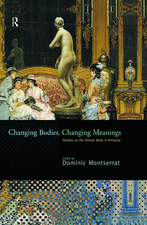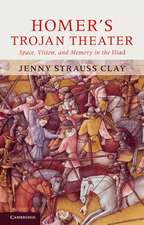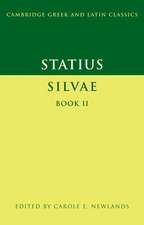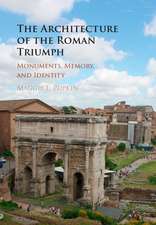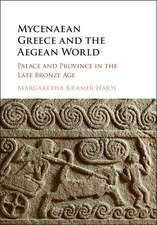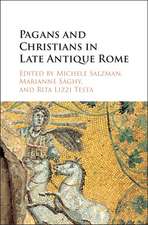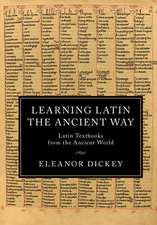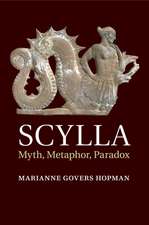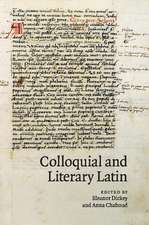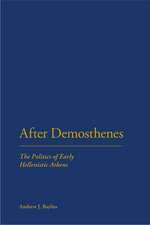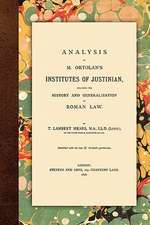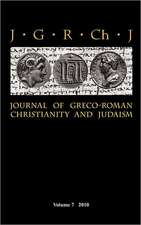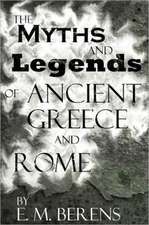An Introduction to the Composition and Analysis of Greek Prose
Autor Eleanor Dickeyen Limba Engleză Paperback – 11 mai 2016
| Toate formatele și edițiile | Preț | Express |
|---|---|---|
| Paperback (1) | 179.92 lei 22-36 zile | +24.21 lei 5-11 zile |
| Cambridge University Press – 11 mai 2016 | 179.92 lei 22-36 zile | +24.21 lei 5-11 zile |
| Hardback (1) | 621.22 lei 43-57 zile | |
| Cambridge University Press – 11 mai 2016 | 621.22 lei 43-57 zile |
Preț: 179.92 lei
Nou
Puncte Express: 270
Preț estimativ în valută:
34.43€ • 35.73$ • 28.78£
34.43€ • 35.73$ • 28.78£
Carte disponibilă
Livrare economică 24 februarie-10 martie
Livrare express 07-13 februarie pentru 34.20 lei
Preluare comenzi: 021 569.72.76
Specificații
ISBN-13: 9780521184250
ISBN-10: 0521184258
Pagini: 312
Dimensiuni: 175 x 245 x 14 mm
Greutate: 0.63 kg
Editura: Cambridge University Press
Colecția Cambridge University Press
Locul publicării:Cambridge, United Kingdom
ISBN-10: 0521184258
Pagini: 312
Dimensiuni: 175 x 245 x 14 mm
Greutate: 0.63 kg
Editura: Cambridge University Press
Colecția Cambridge University Press
Locul publicării:Cambridge, United Kingdom
Cuprins
Preface; Bibliography; Accentuation; 1. Articles; 2. Modifiers; 3. Tenses, voices, and agreement; 4. Cases; 5. Participles; 6. The structure of a Greek sentence: word order and connection; Review exercises; 7. Conditional, concessive, and potential clauses; 8. Relative clauses; 9. Pronouns; 10. Indirect statement; 11. Questions; Review exercises; 12. Purpose, fear, and effort; 13. Cause, result, and 'on condition that'; 14. Comparison and negatives; 15. Commands, wishes, and prevention; 16. Temporal clauses; Review exercises; 17. Impersonal constructions and verbal adjectives; 18. Oratio obliqua; 19. Summary; 20. Consolidation; Appendices: A. Errors in Smyth's Grammar; B. English tenses and their Greek equivalents (indicative only); C. Hints for analysing Greek sentences; D. English conditional clauses; E. A selection of terminologies for describing Greek conditional sentences; F. Short, easily confused words; G. Partial answer key; H. The next step: prose composition as an art form; Principal parts; Vocabulary; Index to vocabulary.
Recenzii
'Eleanor Dickey's book is nothing short of a complete, stand-alone Greek prose composition course, one that touches on the sorts of skills and practice found in recent studies to be essential to language acquisition: alternating composition with reading and analysis of sentences in the target language, constant self-testing, engaging students' recall, interleaving various types of exercises, regularly revisiting common structures, and recontextualizing important skills. There is simply no other Greek prose composition book like it.' Ryan C. Fowler, Franklin and Marshall College, Pennsylvania
'Dickey's book satisfies a long-standing need for a serious, comprehensive textbook in Greek prose composition. Indeed, until now, teachers of Greek composition have had to rely on antiquated primers more than a century old, often geared to very young students rather than those at University level. Dickey's book offers students both basic and complex grammar review, and then gradually shows them how to think about style as well. Written in lucid, contemporary prose, with a variety of exercises systematically presented, this book will surely become the standard choice of our time for teaching Greek prose composition and style.' Ralph M. Rosen, University of Pennsylvania
'This is the book on Greek syntax that every teacher of Greek composition has always wanted. After using earlier versions of it in class over the years, I have to express my full satisfaction because each part serves entirely the needs of both students and their instructors. Students have at their disposal exercises that can be done in class, others that can be assigned as homework and more that can be used for extra practice. The ten exercises in each lesson that are in the answer key can also be useful when a student has to miss a class. At the end, students are fully prepared to proceed to a higher stage of learning how to compose passages in the style of a certain Greek author.' Raffaella Cribiore, New York University
'A pragmatic and hands-on textbook which will be of great value to those seeking to deepen their linguistic skills by back-translation.' Martin Revermann, University of Toronto
'Dickey dedicates this book to her students, and this devotion to students can be felt on every page. The choices made, the added details, the streamlined exercises all betray her thoughtful care and genuine concern for the student's experience. Witnessing my own students work through this book proved my original impressions about it: the students not only quickly improved and mastered the material despite its challenges, but clearly enjoyed doing so. But the best news of all may be that with the book's partial answer key and clear instructions, no student needs to wait until the class is on offer at their (or some nearby) university: just go buy the book, get to work, and enjoy it.' Stephen Kidd, Bryn Mawr Classical Review
'Dickey's book satisfies a long-standing need for a serious, comprehensive textbook in Greek prose composition. Indeed, until now, teachers of Greek composition have had to rely on antiquated primers more than a century old, often geared to very young students rather than those at University level. Dickey's book offers students both basic and complex grammar review, and then gradually shows them how to think about style as well. Written in lucid, contemporary prose, with a variety of exercises systematically presented, this book will surely become the standard choice of our time for teaching Greek prose composition and style.' Ralph M. Rosen, University of Pennsylvania
'This is the book on Greek syntax that every teacher of Greek composition has always wanted. After using earlier versions of it in class over the years, I have to express my full satisfaction because each part serves entirely the needs of both students and their instructors. Students have at their disposal exercises that can be done in class, others that can be assigned as homework and more that can be used for extra practice. The ten exercises in each lesson that are in the answer key can also be useful when a student has to miss a class. At the end, students are fully prepared to proceed to a higher stage of learning how to compose passages in the style of a certain Greek author.' Raffaella Cribiore, New York University
'A pragmatic and hands-on textbook which will be of great value to those seeking to deepen their linguistic skills by back-translation.' Martin Revermann, University of Toronto
'Dickey dedicates this book to her students, and this devotion to students can be felt on every page. The choices made, the added details, the streamlined exercises all betray her thoughtful care and genuine concern for the student's experience. Witnessing my own students work through this book proved my original impressions about it: the students not only quickly improved and mastered the material despite its challenges, but clearly enjoyed doing so. But the best news of all may be that with the book's partial answer key and clear instructions, no student needs to wait until the class is on offer at their (or some nearby) university: just go buy the book, get to work, and enjoy it.' Stephen Kidd, Bryn Mawr Classical Review
Notă biografică
Descriere
This book offers a lively, intelligent, accurate, comprehensive, and up-to-date introduction to translating into ancient Greek.




